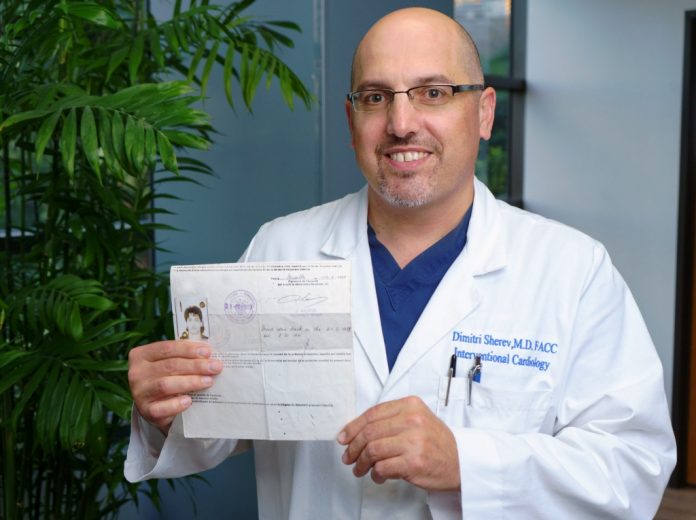Brussels, Belgium, 1989: A single light within the U.S. Embassy pierces the night, illuminating the way for Dimitri Sherev to take his first steps toward freedom. These steps were the first of many that would eventually lead the political refugee to become a doctor halfway around the world.
Now, Sherev has served San Diego for 14 years as an interventional cardiologist affiliated with Sharp Grossmont Hospital.
Sherev was raised in the People’s Republic of Bulgaria, where he remembers seeing rampant injustice and economic instability. From a young age, he wanted to escape the clutches of the Communist Party and often dreamed of visiting his grandparents, who moved to the U.S. shortly after World War II.
His opportunity came at age 18, when he was granted special authorization to leave the country to compete on the Bulgarian Junior National Hockey Team. One night, after a game in Brussels, he escaped to the U.S. Embassy.
He still vividly remembers the rush he felt as he walked through the embassy gates and thinking, “Finally, I am free!” He spent the next nine months living in a refugee camp and working as a baker until his asylum documents were processed.
Finding a home — and a career — in San Diego
When Sherev arrived in San Diego to live with his grandparents, he was eager to pursue the American dream. He worked as a laborer and took classes at Southwestern College until he could apply to UC San Diego, where he graduated summa cum laude. He attended UCLA for medical school and discovered cardiology was his calling during an internship at Cedars-Sinai Medical Center.
“Cardiology is the perfect blend of surgery and medicine,” he said.
After completing his fellowship, Sherev knew returning to San Diego to practice cardiology was the right fit for his growing family and he proudly accepted a position at Sharp Grossmont Hospital. Since then, his practice has become one of the county’s leaders in cardiology.
“We use cutting-edge technology to provide the best possible outcomes for our patients with complex issues with low complication rates,” said Sherev.
One such technology is the transcatheter aortic valve replacement (TAVR) procedure, which he helped introduce to East San Diego County several years ago. This procedure is a less-invasive alternative to open-heart surgery that has helped many people lead longer, healthier lives.
Immigrant experience shapes approach to medicine
Sherev’s experience as an immigrant shaped how he practices medicine.
“When I first got to the U.S., I thought I might not be welcomed,” he said. “I had no idea I would receive so much help and support along the way. I model my life based on that. I want to return that kindness and support to others.”
In addition to his native Bulgarian and English, Dr. Sherev also speaks Russian, Spanish and some Arabic.
“One of the things I love in practicing medicine is that there is an ongoing learning from multilingual staff and patients,” he said. “Speaking in the patients’ native language helps to connect [with them] better, and patients feel comfortable and accepted.”
This article features experts from Sharp Grossmont Hospital. For more health stories visit www.sharp.com/news.














